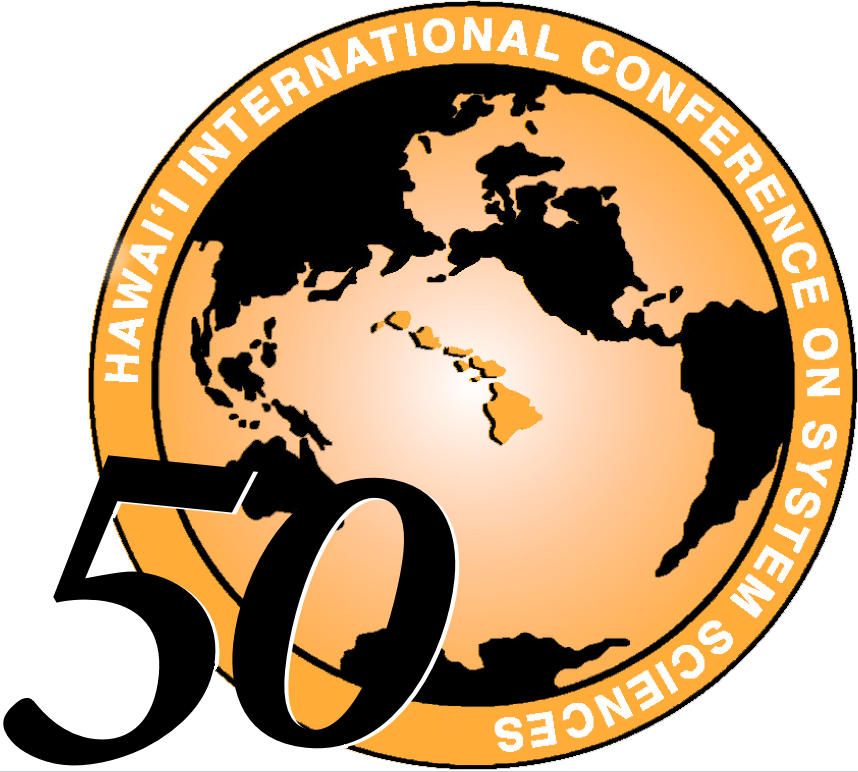HICSS - 50 E-Government Track
50th Hawaii International Conference on System Sciences
January 4-7, 2017 - Hilton Waikoloa Village, Big Island, HI, USA
Overview
Minitracks
Symposia and Workshops
Other Links
Participation, Crowdsourcing, Co-Creation, and Innovation in Open Government



Minitrack Description
This minitrack focuses on the interactions between the public, civil society, the private sector, and governments. As e-Government becomes more ubiquitous, many questions arise about what it means to develop and maintain an open and transparent government; engage in participatory government; leverage community knowledge through crowsourcing; encourage governance through transparency initiatives; support co-design and collaborative government through openness; the use of open and big data for policy- and decision-making; foster openness through partnerships and collaborations with residents, civil society, and the private sector; promote innovations in open data release, applications, and use; reduce corruption; and study how governments/ governmental institutions might be influenced through openness and transparency efforts. This minitrack includes research on and studies of involvement of non-governmental actors in the development, use, and evaluation of e-Government and participatory government dynamics, initiatives, and systems, including research that develops and explores open and transparent government frameworks, theories, evaluation, and practice.
Open government is an approach which purposefully emphasizes and re-invigorates the basic principle of responsive, engaged, and innovative government.Through information technology, committed administrative leadership, international initiatives such as the Open Government Partnership, and policies, countries around the world have now entered an era of unprecedented transparency of government operations and decision-making intended to lead to a more responsive, accountable, collaborative, participatory, innovative, and trustworthy government.
Additionally, involvement of the public, civil society, and the private sector in the creation, design, and evaluation of e-Government systems leads to more effective digital tools for engagement and participation in the long run.
We welcome theoretical papers as well as quantitative and qualitative studies on the topics. Good case studies will also be accepted with strong implications for theory and practice.
Minitrack topics include, but are not limited to:
- Theories, quantitative and qualitative studies on open government
- Open/transparent government initiatives around the world
- Open data in government and applications built on open data
- Technologies enabling/inhibiting open/transparent government
- Crowdsourcing in government
- Collaborative design and participation by citizens
- E-Citizen, e-Democracy and e-Participation
- Participation and deliberation
- Innovation through open data and government
- Freedom of information and transparency
- Studies of citizens and democratic processes in social media and/or virtual worlds
- Impact on society, communities, companies and government
- Good practices and pitfalls in open government, public engagement, collaboration
- Technology-based approaches to making government information available
- Studies of the universal access requirements of e-Government
- Impact of policy on transparency and openness
- Methods, practices, and approaches to assess the success of open government efforts
- Privacy, security, and the right to know
More information on the mini-track chairs:
Mitch Cochran is the Information Systems Manager for the City of Monrovia, California. His research interests are governance, operations and e-Government. He has been active in the Municipal Information Systems Association of California (MISAC), working on statewide audits and education programs. He earned a Masters in Homeland Security from Penn State (2008) and in Administration from UC Riverside (1984) along with a B.S. in Statistics from UC Riverside (1982).
John Carlo Bertot, PhD/Syracuse, is Professor at the University of Maryland's College of Information Studies. He also serves as Co-Director of the Information Policy & Access Center. His research and teaching focus on information policy, equitable access, and public service innovation. He served as editor of Government Information Quarterly from 2000-2015, and is past-president of the Digital Government Society.
Scott P. Robertson, PhD, is an Associate Professor in the Department of Information and Computer Sciences at the University of Hawaii at Manoa where he is also the founder and director of HICHI, the Hawaii Computer- Human Interaction Lab. He teaches and conducts research in the area of Human-Computer Interaction, specifically social networking and digital government. Scott earned his PhD from Yale University (1983), an M.A. in Psychology/Cognitive Science from California State University, Fullerton (1979), and a B.A. in Psychology from the University of California, Irvine (1976).
Co-Chairs
Mitch Cochran
(Primary Contact)
City of Monrovia
415 S Ivy Ave,
Monrovia, CA 91016, USA
Phone: +1-626-932-5561
Email: mcochran.it@gmail.com
John Carlo Bertot
College of Information Studies
University of Maryland
2118B Hornbake Building, South Wing
College Park, ML 20742, USA
Phone: +1-301-405-3267
Fax: +1-301-314-9145
Email: jbertot@umd.edu
Scott P. Robertson
Department of Information and Computer Sciences
University of Hawaii at Manoa
Pacific Ocean Science and Technology Building
1280 East-West Road
Honolulu, HI 96822, USA
Phone: +1-808-956-2023
Fax: +1-808-956-3548
Email: scottpr@hawaii.edu
